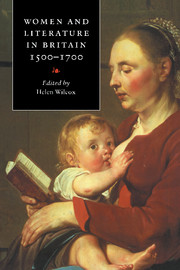Book contents
- Frontmatter
- Contents
- List of contributors
- Acknowledgements
- A note on references
- Chronology: women and literature in Britain, 1500–1700
- Introduction
- Part I CONSTRUCTING WOMEN IN EARLY MODERN BRITAIN
- Part II WRITING WOMEN IN EARLY MODERN BRITAIN
- Chapter 7 Renaissance concepts of the ‘woman writer’
- Chapter 8 Courtly writing by women
- Chapter 9 Women's poetry in early modern Britain
- Chapter 10 Women's writing and the self
- Chapter 11 The possibilities of prose
- Chapter 12 The first female dramatists
- Further reading
- Index
Chapter 12 - The first female dramatists
Published online by Cambridge University Press: 22 September 2009
- Frontmatter
- Contents
- List of contributors
- Acknowledgements
- A note on references
- Chronology: women and literature in Britain, 1500–1700
- Introduction
- Part I CONSTRUCTING WOMEN IN EARLY MODERN BRITAIN
- Part II WRITING WOMEN IN EARLY MODERN BRITAIN
- Chapter 7 Renaissance concepts of the ‘woman writer’
- Chapter 8 Courtly writing by women
- Chapter 9 Women's poetry in early modern Britain
- Chapter 10 Women's writing and the self
- Chapter 11 The possibilities of prose
- Chapter 12 The first female dramatists
- Further reading
- Index
Summary
Then she usurpes upon anothers right,
That seekes to be by publike language grace't:
And though her thoughts reflect with purest light,
Her mind if not peculiar is not chast.
The woman playwright's accession to ‘public language’ is, as this quotation from the first original published play in England by a woman, Elizabeth Cary's The Tragedie of Mariam (1613), illustrates, almost inevitably attended by animadversions on her chastity. It is not language itself, but specifically its ‘publicity’ (the refusal to keep the mind ‘peculiar’, that is private or to itself) that is at issue here for women as writers. Yet, despite this consistent equation of public display with public shame, the state and status of women's playwrighting undergoes dramatic transformation between the beginning of our period, the early sixteenth century, and its close, the late seventeenth century. The earliest play discussed, Jane Lumley's Iphigenia in Aulis, is a manuscript translation of Euripides, probably produced as a schoolgirl's exercise around 1550 by an aristocratic daughter and available as part of a manuscript volume of writings, otherwise in Latin, which appear to have been presented to her father, Lord Arundel, through her husband, Baron John Lumley.
- Type
- Chapter
- Information
- Women and Literature in Britain, 1500–1700 , pp. 267 - 290Publisher: Cambridge University PressPrint publication year: 1996
- 6
- Cited by

